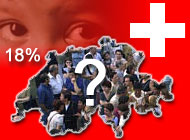
Swiss set to decide whether to reduce number of foreigners

The Swiss people are going to the polls this weekend in a series of referenda - including a controversial proposal to cut the number of foreigners resident in the country to 18 per cent.
Latest opinion polls indicate the move will be defeated. The most recent poll suggested 50 per cent of the electorate will vote against, with 29 per cent in favour.
The government, big business and the main political parties came out against the measure – the only exception being the right-wing People’s Party, which is divided over the issue.
The initiative, launched by a local Radical Party politician from Aargau, Philipp Müller, seeks to reduce the number of foreigners to the 1994 level when the initiative was launched. The number has risen steadily in recent years and now stands at 1.3 million – 19.3 per cent of the population.
The proposal has aroused considerable controversy. Opponents said it would harm the Swiss economy, heavily dependent on foreign labour, and damage Switzerland’s image abroad.
But supporters want to stem the flow of foreigners – or particular categories of foreigners, prevent the over-population of Switzerland and cut back on the number of poorly qualified workers.
Opponents said a reduction in foreigners would also call into question the bilateral accords that Switzerland has signed with the European Union which allows for the free movement of people. Supporters of the initiative have denied this.
The Swiss are also voting this weekend on three energy-related proposals. All of them are proposing a levy on the use of non-renewable energy sources, but differ on the size of the tax and how the proceeds would be used.
The Solar Initiative proposes a constitutional change to introduce a tax surcharge on non-renewable energy, such as nuclear power, gas and petroleum.
It envisages a levy on energy bills of SFr0.01 rising to SFr0.05 per kilowatt-hour within the first five years. This is expected to raise about SFr750 million annually over 25 years.
The revenue would be used to promote more economical energy consumption and alternative energy sources. According to the proposal, at least half of the money raised would go towards encouraging the use of solar energy.
Supporters, including the Social Democratic Party and the Greens, argued that the initiative would reduce harmful CO2 emissions by at least 10 per cent.
However, the government and parliament, as well as the business community and the main centre-right parties came out against the initiative.
Parliament and the government put forward a counter-proposal, which envisages a surcharge of SFr0.03 per kilowatt-hour on non-renewable energy over a period of 10 to 15 years.
The proceeds, estimated at about SFr450 million annually, would be used to promote all renewable forms of energy, especially hydroelectric plants.
Voters can say “yes” to both proposals, but they will then have to state a preference.
A third proposal, backed by parliament and government, seeks to introduce a maximum surcharge of SFr0.2 per kilowatt-hour. It is expected to result in SFr3 billion in revenues per year.
Under the proposal, the revenue would be returned to individuals and businesses, with the funds then used for social insurance.
Swiss voters are also voting on the voting process itself. Another initiative being considered on Sunday, would in future allow the electorate to accept part of a referendum proposal. At the moment, the electorate is faced with the choice of accepting all or nothing.
However, analysts say there is little chance of the initiative for a “constructive referendum” being accepted.
swissinfo with agencies

In compliance with the JTI standards
More: SWI swissinfo.ch certified by the Journalism Trust Initiative




























You can find an overview of ongoing debates with our journalists here . Please join us!
If you want to start a conversation about a topic raised in this article or want to report factual errors, email us at english@swissinfo.ch.